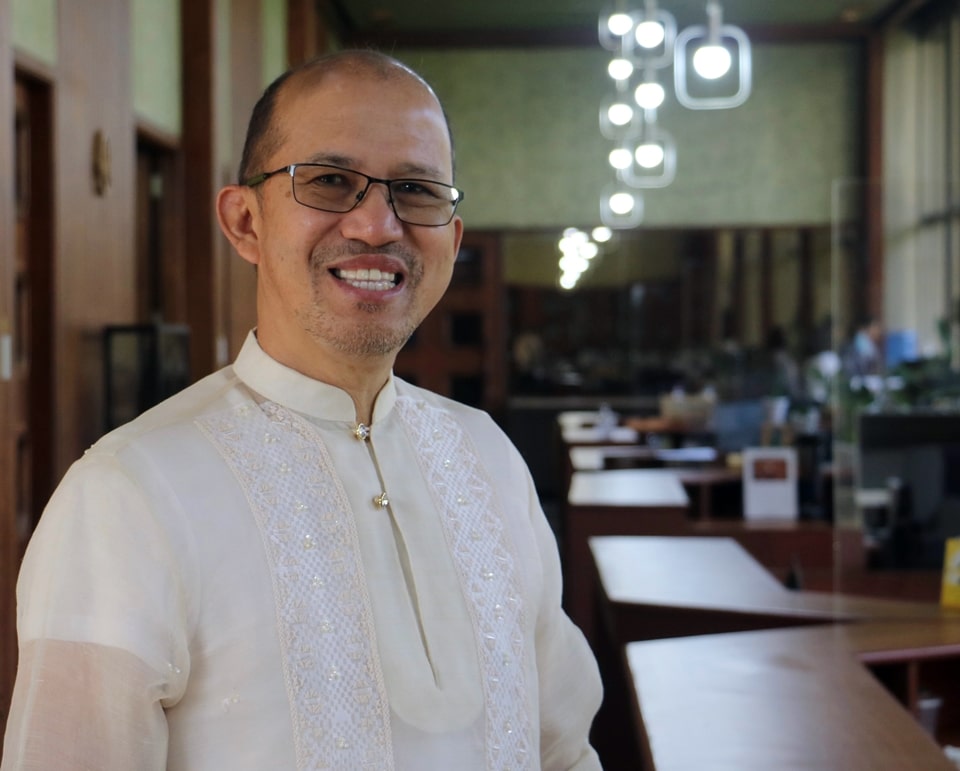 Dr. Glenn B. Gregorio, Director of the Southeast Asian Regional Center for Graduate Study and Research in Agriculture (SEARCA), has been appointed as one of the new Champions of the United Nations (UN) Food Systems Summit 2021.
Dr. Glenn B. Gregorio, Director of the Southeast Asian Regional Center for Graduate Study and Research in Agriculture (SEARCA), has been appointed as one of the new Champions of the United Nations (UN) Food Systems Summit 2021.
According to the UN, “the Champions Network mobilizes a diverse range of people in every region of the world to call for fundamental transformation of the world’s food systems. Champions are leaders of institutions and networks advancing food systems transformation and thought leadership.”
Dr. Gregorio said being a Food Systems Champion “aligns well with SEARCA’s mandate and its focus on accelerating transformation through agricultural innovation (ATTAIN) while pursuing the Sustainable Development Goals (SDGs) by strengthening academe-industry-government interconnectivity.
Currently, SEARCA is working on reinforcing transformative change in agricultural food systems through various initiatives with its partners. Such efforts include developing a digital agriculture platform to provide farmers with real-time farm management technical support and access to modern markets. Together with the Economic Research Institute for ASEAN and East Asia (ERIA), SEARCA is also developing the ASEAN Guidelines that will outline conditions and actions needed for the inclusive and sustainable use of digital technologies for agriculture and food system improvements.
Dr. Gregorio said becoming a Food Systems Champion will “give us more opportunity to work with like-minded organizations and individuals towards the same goal of achieving the SDGs and food security.”
He added that “there are already many activities happening in in Europe, Africa, and other parts of the world as pre-events to the Food Systems Summit and it will be good for Southeast Asia to be part of the movement too.”
Expected to be held in September this year, the UN Food Systems Summit aims to raise awareness on the centrality of food system to the entire sustainable development agenda and draw attention to the urgency of transforming food systems, particularly in light of the COVID-19 pandemic. Moreover, the landmark meeting seeks to help stakeholders achieve the SDGs “in 10 years through a food systems approach, leveraging the interconnectedness of food systems to global challenges such as hunger, climate change, poverty, and inequality.” It to intends to align stakeholders around a common understanding and narrative of a food system framework as a foundation for concerted action.
The UN says that the Food Systems Champions are leaders in their respective fields of expertise and communities, who will “advocate for more resilient, healthy, inclusive and sustainable food systems. They will mobilize their networks to engage in dialogues and bring about actions that enable accessible and wide-ranging solutions to overcome challenges in national and regional food systems.”
As part of the Champions Network, Dr. Gregorio commits to contribute to substantive discussions, generate ideas, and take action to strengthen food systems, and share information to ensure anyone with an interest in food systems at all levels can engage with the Summit.
Dr. Gregorio brings with him his experience and leadership in the transformation of foods systems both in the education and research contexts within Southeast Asia, as well as ensures that SEARCA’s efforts align with those of other global, regional, and national organizations toward contributing to the achievement of the SDGs.
The SEARCA Director is also a Professor at the University of the Philippines Los Baños-College of Agriculture and Food Science and Academician at the National Academy of Science and Technology (NAST), Philippines. Moreover, Dr. Gregorio is President of the Society for the Advancement of Breeding Research in Asia and Oceania (SABRAO) until 2023 and the Chairperson of the Commission on Higher Education (CHED) Technical Panel for Agriculture until 2024.
“The Champions will work closely with the UN Secretary-General’s Special Envoy Agnes Kalibata to kick start activities in the build up to the Summit, including discussions on how to galvanize and build their networks to unleash ambitious new actions, innovative solutions, and plans to transform food systems in alignment with diverse local contexts,” the UN said in a statement when it released the initial list of Food Systems Champions.